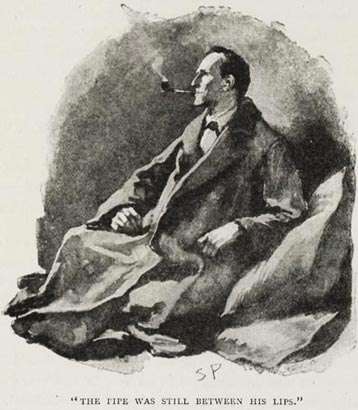

Anyone familiar with the carnation of Rathbone (Sherlock Holmes) and Nigel Bruce (Doctor Watson) would immediately realize how little the renown forties series and Gillette's screen adaptation have nothing in common, not even any by-plays and great chemistry between Holmes and Watson that made the Universal films work so well.

What makes this edition so special is it's historical account and reproduction and cast reprising their original roles from the popular stage play, notably William Gillette (1855-1937), the actor long associated with the title role decades before Basil Rathbone won that honor though his 14-film theatrical series produced by Universal in the 1940s. SHERLOCK HOLMES (Essanay, 1916), directed by Arthur Berthelet, is not the first nor the last motion picture produced depicting on the most recognizable and famous fictional detective of all time, Sir Arthur Conan Doyle's Sherlock Holmes. His overconfidence is his greatest trait and he has none of that here. One thing lacking is that Holmes is uninteresting and dull. She also becomes a love interest for Holmes.

There are a series of ridiculous plots that don't work because people are stupid. There are a man and his wife, the Larabees, who also want to get their hands on those letters in order to turn a profit. Holmes has been hired to get those letters (like in "A Scandal in Bohemia"). She has letters that would prove embarrassing to a prince. The story is a bit confusing at first, but it involves a young woman whose sister had an affair with royalty. This version is the stage version, sans most of the dialogue. Secondly, we get to see the famous William Gilette, who played the great detective over 1000 times on the stage. First of all, it is in marvelous condition for something made in 1916. There are two things to recommend this film. This film is so much better than the 1922 version with John Barrymore so film buffs have a lot to celebrate with this one turning up.
#OTHER NOVEL SHERLOCK HOLMES APPEARANCE MOVIE#
The movie has a terrific pace to it and it's well-shot. SHERLOCK HOLMES features a story written by Gillette and it too is very good and manages to hold you attention for a few minutes shy of two hours. Kay is also very good in her role as is Ernest Maupain as Professor Moriarty and Edward Fielding as Dr. It's rather shocking that this was Gillette's only time in front of the camera because he really comes off as a natural. Gillette certainly makes for a very good Holmes as he certainly has command of the character and a certain grace that really jumps off the screen. The film is pretty much what you would have seen on the stage at the time so it's fascinating getting to see the film. It's almost hard to believe but this here was Gillette's only film and it was produced by the Essanay Company after they lost Charlie Chaplin. Whenever someone thought of Holmes it was Gillette that they thought of and you can see certain things that would be borrowed by future actors. Gillette was one of the most famous actors of his time and he did a tremendous tour playing Holmes, which took him around the world. SHERLOCK HOLMES, on the other hand, is actually a very good movie and it turns out to be a real discovery. Even if they aren't that good it's always great when one is discovered. I love silent movies and each year it seems more and more films are being discovered, which is great but I've noticed that a lot of the films aren't all that good.

SHERLOCK HOLMES was a lost film for decades but thankfully a print from France showed up. A couple blackmailers learn of the letters so they kidnap Alice and plan on using the letters for money but Sherlock Holmes (William Gillette) also has an interest in them. Her sister Alice (Marjorie Kay) gains possession of the letters and the Royal family wants them back. Sherlock Holmes (1916) *** (out of 4) A member of the Royal family writes some letters to a woman who suffers from a broken heart and dies.


 0 kommentar(er)
0 kommentar(er)
